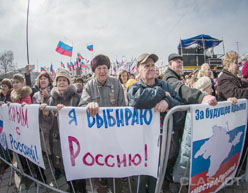Moscow marks the first anniversary of Crimea reunification with Russia

The slogan, “Crimea is ours!” highlighted the dawn of a new geopolitical reality, the reunification of the Crimea with its historical motherland,
The emphatic statement, “Crimea is our!”, fully underscores the national belief that
Russians don't give a dime about the West and its sanctions because, the truth, the historical truth, is on their side. This is because the landmark decision taken in March 2014 only served to correct the blatant injustice done against
The Crimeans’ fate was further worsened by the unwillingness and/or lack of intelligence among the new post-Soviet Russian leaders to demand the return of Crimea back to
Imposing sanctions on
For example, how can one measure the joy on the faces of most of the Crimeans and Russians, the “tears of happiness” in the eyes of the acting
After all, no one nation or country on earth, at least in modern times, has ever achieved such a feat, namely, return an illegally transferred territory to its historical owners exclusively by peaceful means. Without war, deaths of innocent people masked under various euphonious slogans, such as in the name of a brighter future, democratization of society, protection of the rights of the oppressed people, or so-called "humanitarian intervention," etc.
Even if one adopts the material approach, the reunification of the Crimea with
Most of the adult part of “these new citizens” represents a highly educated workforce with different professions and qualifications, meaning that it can instantly contribute to, and possitively impact, on Russia's GDP, enrich and further diversify its cultural and ethinc composition and spiritual heritage, increase its scientific potential, sports and military prowess, etc. All these gains surpass all the damages and deprivations resulting from the sanctions or the unfriendly position of the West on the Crimean issue in particular and the entire Ukrainian crisis as a whole.
Russia will suffer from, but will certainly survive, these sanctions and related difficulties, but never again will anyone in the country be willing to give the Crimea to someone else and/or betray the Crimeans for the sake of geopolitical expediency or other causes and reasons, especially after all that happened over the past 12 months. And, the current Russian leadership, headed by highly popular Putin, will definitely not embark on such a course, knowing fully well that such a move would mean the beginning of the demise of
Indeed, this was not the reason, why Putin, in his words, was even willing to put the country's most lethal armaments, nuclear weapons, on fully military alert in March last year in case some hotheads and war hawks in some countries wanted to interfere or torpedo the new emerging geopolitical reality resulting from reunion of the Crimean peninsula to its motherland.
There had been some information about some telephone conversations between Putin and
The primary challenge for the Kremlin today is to transform the peninsula from a poor, federal government subsidy-dependent and backward region into a self-sufficient prosperous province, which is fully attractive for living and entrepreneurship. The Crimean peninsula has all it takes to achieve such goals. It is very rich in human and natural resources, and with effective management and provision of adequate assistance from the Moscow-based federal government, has every chance of becoming an economically robust region.
The economic growth drivers should be the region's core traditional industries, such as tourism, agribusiness, winemaking, logistics, transportation and so forth. The federal government's plans to build a bridge should contribute to and fasttrack the renaissance of the region, make it more accessible, and thus linking it directly (and bypassing the dangerous Ukrainian transit) to the Russian mainland.
In short, there is a lot of work to be done, but there is comfort in the willingness of both the federal and local authorities to solve as soon as possible all the problems that had accumulated over 20 years of the region being a part modern independent Ukraine, which simply did not care for the region's residents, except for the Crimean Tatars. However,
Hence, the main task of the Russian government, from the president and his prime minister down to the lowest ranked bureaucrats, is to do everything possible and impossible so that none of the over 2mln Crimeans that happily voted for their region’s reunification with Russia in the epoch-making spring of 2014 will never have any reasons whatsoever to regret their fully informed and historical decision.
After all, the fates of “the Russian Crimeans” will be closely monitored regionally and globally, especially in
by Christopher N. E. Kenneth












 Web design,
Web design,